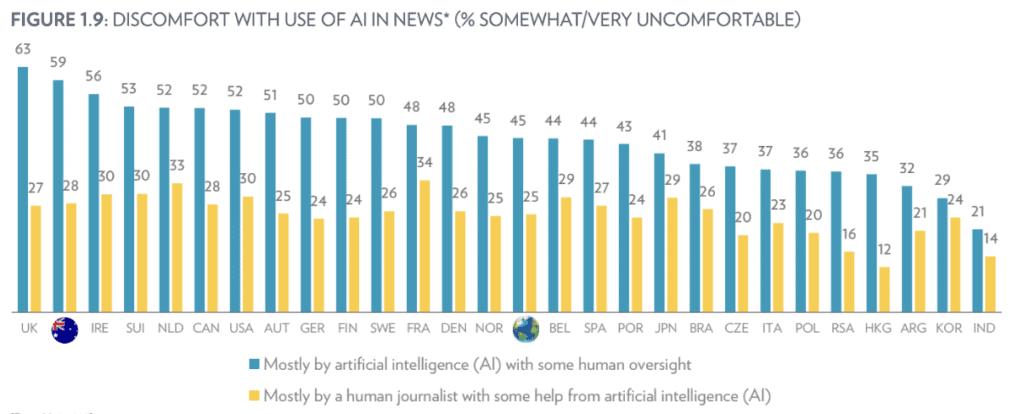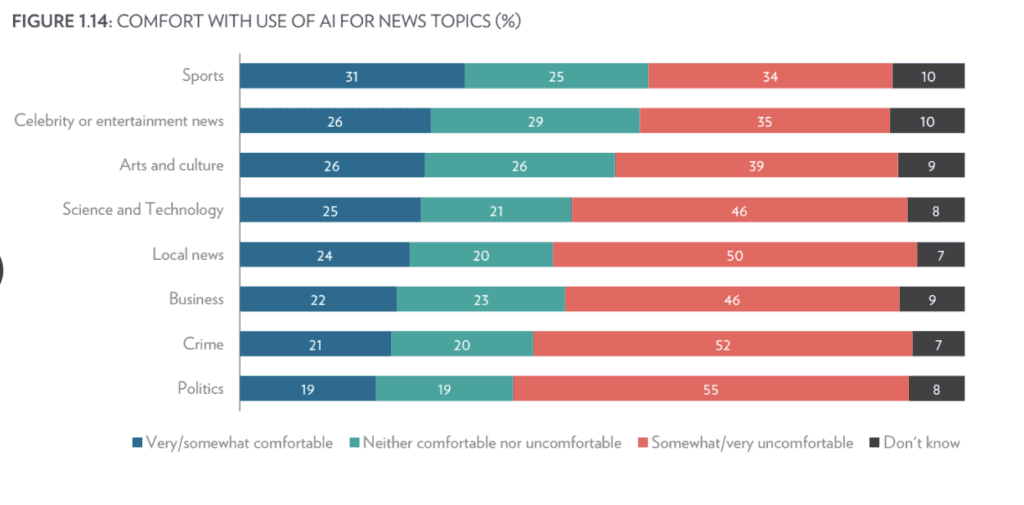Compared to the global average of other countries in 2024’s Digital News Report, Australians are much more uncomfortable about the use of AI in news than consumers in other parts of the world.
Across 26 countries surveyed in the report by the University of Canberra and Reuters Institute, 45% were very or somewhat uncomfortable about news being mainly produced by AI, compared to 59% in Australia.

The report also found that almost half (45%) of participants said they feel very or somewhat comfortable with news mostly produced by a human journalist with the support of AI, compared to 17% who feel comfortable about news produced mostly by AI with some human oversight.
In a major election year that sees nearly half the world’s population head to the polls, the report found participants were least comfortable about political news being mainly produced by AI (19%) and most comfortable with AI producing sports news (31%).
More than half (55%) said they are uncomfortable with AI mainly producing news about politics compared to one-third (34%) being uncomfortable with sport.

While Australians prefer news being produced mainly by a human journalist with AI support, there is a higher tolerance for AI-generated news with human assistance from men, younger generations, those with higher news consumption, education, and interest in news and politics.
Men (48%), Gen Z (54%), Gen Y (51%) and those with higher education (55%) are the most accepting of AI being used to assist in the production of news.
Speaking to Mediaweek, co-founder of men’s lifestyle site Man of Many Scott Purcell said while the site is trying to innovate with AI, it will not use AI to publish content.
“We’re maintaining a firm stance against using AI to publish content directly on our site, ensuring that our editorial integrity and the authenticity of our voice remain intact,” he said.
“Our audience can always expect genuine, high-quality content crafted by real people.”
After being named the most trusted news brand in Australia by the report, SBS’ news director Mandi Wicks added that newsrooms are under pressure to invest more in fact-checking, verification, ‘explainer’ journalism, and social media moderation.
“Softer economic conditions will continue to impact newsrooms and their ability to scale up in these areas without utilising the time-saving measures offered by AI,” she said.
“When robust, fit-for-purpose AI tools are used responsibly and under human supervision, AI has the capacity to enhance rather than undermine trust by improving the reach, accessibility and reliability of news and information.
“Media literacy and enforceable government regulations will be critical to protect democracy and safeguard social cohesion and ensure consumers are exposed to accurate and impartial news and information wherever they choose to read, listen and watch.”
See also: SBS News crowned Australia’s most trusted news brand
See also: ‘Tough space to build sustainable business model’: Local news emerges as most under-served news genre
See also: 25% of Aussies use social media as main news source, despite Meta claims
